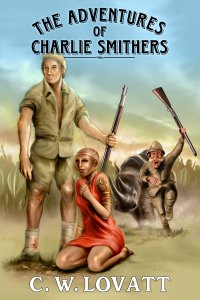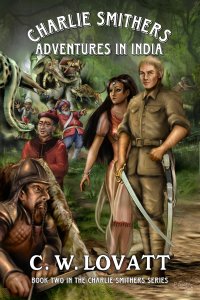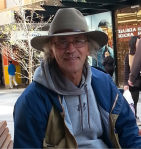Welcome to Author Wednesday. Today I’m please to introduce you to C.W. Lovett, the creator of the humorous Charlie Smithers Collection. The first two books in the series The Adventures of Charlie Smithers and Charlie Smithers: Adventures in India are available now, and the next book in the series, Adventures Downunder, will be released in time for the holidays.

Hello and welcome, C.W. Let’s start with one of my favorite questions for my fellow authors. When were you first able to call yourself either a “writer” or an “author?”
About ten years ago. I’d been writing off and on since the early ’80s but never really took it very seriously. The very idea was so close to pure fantasy that it seemed pointless to pursue it. Aside from that, there was never any encouragement; in fact, quite the opposite. In a small community like the one I live in, there aren’t all that many social circles, and those that we do have consider writing (if they ever consider it at all) as beyond the pale, so it was something I felt that I had to keep a lid on. Then one day I made a new friend, and all that changed. Suddenly, I found myself in a situation where my writing was valued and encouraged, and by someone I respected at that! All that I had to do was apply myself, and boy, did I ever! It was sometime between the time my first short story was published in 2008 and 2013 that I began to whisper ‘writer?’ cautiously in my own ear, and wondered if it might not be too grandiose a word? Then, when my first and second novels were published, and I found that I no longer had to wait an entire year, only to get the inevitable rejection slip in the mail – that my work, in fact, was being accepted, virtually out of hand – that I’m beginning to become more comfortable with the idea.
It’s amazing what a little bit of encouragement can do. Something similar happened to me with my first writer’s group that I attended under the cloak of darkness. What’s the best thing said about one of your books by a reviewer?
This wasn’t a review, exactly, but one day I received a message from a gentleman who wanted me to know that he considered my writing to be the best in genre since my idol, George MacDonald Fraser.
Wow! That must have made you feel like you were doing something right. Now we all get them, if we put our work out in the public domain, and that’s the poor review. What advice can you give to other writers about receiving a bad review?
Suck it up, I’m afraid, and on NO ACCOUNT do you respond. There’s a school of thought that says you should learn from them and, if you can, then all well and good, but personally, I’m skeptical. If you consider yourself to be a serious writer, then you should be writing for yourself, not worrying about what others think. If a reader likes it, fantastic – if they don’t, shrug it off and push on. You can’t please everyone.
Excellent advice. I tend to agree. I do consider what someone has written in a review, but if it doesn’t fit with what I’m intending, then I move on. What’s your one sentence pitch for your Charlie Smithers Collection?
Buy them; they’re fantastic!
You have a superb attitude. What kind of research was required in creating the character of Charlie Smithers and his adventures throughout the collection?
For those of your readers who haven’t read any of the books, Charlie Smithers is the manservant to the nineteenth century adventurer and dunderhead, Lord Brampton, but the books deal with Charlie’s own adventures, in all of the different parts of the old Empire that they travel to, using history, humor and romance as vehicles. Downunder, of course, refers to the Australias, and may well be the most powerful book of the collection.
Now, as to research, there’s usually a healthy mix of pouring over volume after volume of books accompanied by a healthy dollop of Google. However, in the case of Downunder, after sending it off to some Australian friends to check for accuracy in geography, and their rich vernacular, they pretty much all came up with one glaring inconsistency, to whit, ‘Had I never heard of The Great Australian Bight?’ and after a bit more to-ing and fro-ing in our correspondence, an invitation was issued to come see for myself, so I did. For a month, I walked the very ground that Charlie walked, saw the spot were he washed ashore, more dead than alive, felt the same sun that he felt, heard the same birds, saw the same wondrous creatures, and stood in the exact same rooms as he did during his audience with the governor of New South Wales. Having gleaned all the information that I could, I was soon not only able to put right any inaccuracies, but also give the manuscript more depth and color – make it even more three-dimensional than ever.
I’m sure that added to the novel immensely. Is there one book or author with whom you identify or hold up as your standard-bearer?
That would be George MacDonald Fraser, who I briefly referred to earlier – the creator of the Flashman books. I admired his style: his attention to detail, and his insistence on making the historical aspect of his books as accurate as possible. I applaud the way he refused to don kid gloves when dealing with sensitive issues that his contemporaries wouldn’t touch with a ten-foot pole, and the way he did it with such humour, and irreverence had my sides aching from laughter. Agree with his views, or disagree, you couldn’t fault him for his courage, and I suppose that’s what I admire most of all, and learned that, when faced with a prickly issue in a plot, don’t try to avoid it, but face it head-on. The story demands that you give of your best to do it justice; and if you have the courage to see that through, you just might learn something about yourself along the way.
Excellent. I haven’t read him, but now you’ve got me interested. Where do you write?
My earlier stories were written using a desktop computer, so there weren’t many options available, insofar as location was concerned. After a while, I began to feel that staring at the same walls, day after day, wasn’t conducive to a fresh outlook, so I bought a laptop in 2009, and have been writing everywhere you can imagine since. Sometimes I write during commercials when watching the news, under the cottonwoods in my yard in the summer, in the living room by a window, or out on the deck in late November, bundled up to try to stay warm. Every book has a ritual at any given time, but no two are the same.
I’m the same way. This morning I wrote a chapter of my new romance at Barnes & Noble’s cafe. But since they don’t provide outlets for patrons, I moved to the library where I’m facing the Ohio River and the fading colors of autumn. Tomorrow I’ll write somewhere else. Thank you for stopping by today. I’ve very much enjoyed getting to know you a bit better and learning about your writing process. I wish you well with the new release. You’ll have to come back next year and let us know where you’re headed next!
Thank you for having me as your guest. I quite enjoyed myself, and very much appreciate the opportunity to reach out to your readers.
My pleasure. I look forward to reading your books, C.W.
 About C.W. Lovatt: Award-winning author, C. W. Lovatt, is the creator of the critically acclaimed Josiah Stubb, along with the bestselling, Charlie Smithers collection. The third book in this series, Adventures Downunder is set to be released before Christmas.
About C.W. Lovatt: Award-winning author, C. W. Lovatt, is the creator of the critically acclaimed Josiah Stubb, along with the bestselling, Charlie Smithers collection. The third book in this series, Adventures Downunder is set to be released before Christmas.
Links:
The Adventures of Charlie Smithers (Amazon US)
The Adventures of Charlie Smithers (Amazon UK)
Charlie Smithers: Adventures in India (Amazon US)
Charlie Smithers: Adventures in India (Amazon UK)


5 responses to “AUTHOR WEDNESDAY – C.W. LOVATT”
Reblogged this on The Little Blue Balloon.
LikeLike
Thank you for the reblog, Georgina!
LikeLiked by 1 person
Welcome 🙂
LikeLiked by 1 person
This sounds wonderful. Thanks for the introduction 🙂
LikeLiked by 1 person
You’re very welcome – we’re just one big family of authors. It’s amazing how large that family is!
LikeLike